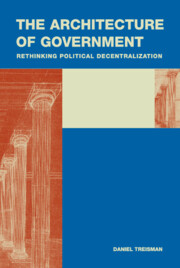Book contents
- Frontmatter
- Contents
- List of Figures and Tables
- Preface
- Glossary of Main Notation Used
- 1 INTRODUCTION
- 2 THE POLITICAL PROCESS
- 3 ADMINISTRATIVE EFFICIENCY
- 4 COMPETITION AMONG GOVERNMENTS
- 5 FISCAL POLICY AND REDISTRIBUTION
- 6 FISCAL COORDINATION AND INCENTIVES
- 7 CITIZENS AND GOVERNMENT
- 8 CHECKS, BALANCES, AND FREEDOM
- 9 ACQUIRING AND USING KNOWLEDGE
- 10 ETHNIC CONFLICT AND SECESSION
- 11 DATA TO THE RESCUE?
- 12 CONCLUSION: RETHINKING DECENTRALIZATION
- References
- Index
- Titles in the series
3 - ADMINISTRATIVE EFFICIENCY
Published online by Cambridge University Press: 05 June 2012
- Frontmatter
- Contents
- List of Figures and Tables
- Preface
- Glossary of Main Notation Used
- 1 INTRODUCTION
- 2 THE POLITICAL PROCESS
- 3 ADMINISTRATIVE EFFICIENCY
- 4 COMPETITION AMONG GOVERNMENTS
- 5 FISCAL POLICY AND REDISTRIBUTION
- 6 FISCAL COORDINATION AND INCENTIVES
- 7 CITIZENS AND GOVERNMENT
- 8 CHECKS, BALANCES, AND FREEDOM
- 9 ACQUIRING AND USING KNOWLEDGE
- 10 ETHNIC CONFLICT AND SECESSION
- 11 DATA TO THE RESCUE?
- 12 CONCLUSION: RETHINKING DECENTRALIZATION
- References
- Index
- Titles in the series
Summary
How could the general of an army be instantaneously obeyed by all its soldiers if the army were not divided into regiments, the regiments into companies, the companies into squadrons? This being so, the general's commandment is conveyed at once to the colonels, then by them to the captains, by the captains to the corporals, and by them to the plain soldiers, so that the lowest soldier in the army is very soon told of it. But the effect of order is still more admirable in a state than in an army. For while the army is crowded together in a small space, the state ordinarily embraces extensive territory; and while the army as a whole does not last very long, the state endures almost for ever. All this happens by virtue of order. For the sovereign lord has his general officers near him, and they send his directives to the provincial magistrates, they to the municipal magistrates, and these last see to it that the people carry them out.
Charles Loyseau (1994 [1610], p. 6)In the first place, administration becomes more difficult over great distances, just as a weight becomes heavier at the end of a long lever. It also becomes more burdensome as the chain of command is lengthened. For to begin with, each town has its own administration, for which the people pays; each district has one, for which the people again pays; next each province, and then the larger governmental units, satrapies or vice-royalties, for which it is necessary to pay ever more dearly the higher up the scale we mount, and always at the expense of the unfortunate people; finally comes the supreme administration, which crushes everything. All these surcharges constantly exhaust the subjects; far from being better governed by all these various agencies, they are less well served than would be the case if they were subject to one only.
Jean-Jacques Rousseau (1986 [1762], pp. 48–9)Information
- Type
- Chapter
- Information
- The Architecture of GovernmentRethinking Political Decentralization, pp. 53 - 73Publisher: Cambridge University PressPrint publication year: 2007
